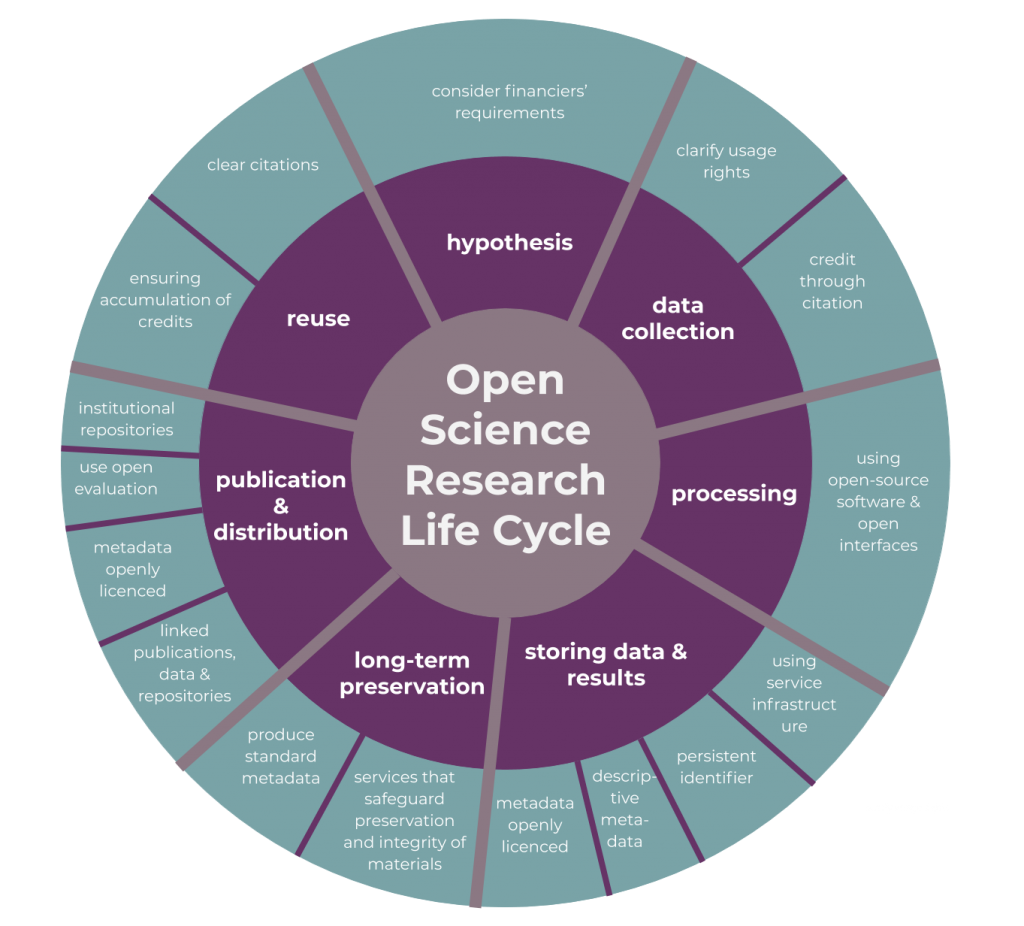
Tell us which feature of the Open Science Research Life Cycle is particularly relevant for your research. If you are new to the Open Science community, let us know what you want to know more about. Leave your answer in the comment section!
Sag uns, welcher Aspekt des Open Science Research Life Cycle besonders relevant für deine Forschung ist. Solltest du du neu in der „Offene Wissenschaft“-Gemeinschaft sein, lass uns wissen worüber du mehr erfahren möchtest. Hinterlasse deine Antwort in der Kommentarspalte!

Andreas Pacher
My project is about webscraping hundreds of scientific journals‘ webpages so as to fetch data about editors and editorial boards.
Many of the aspects in the ‚Open Science Research Life Cycle‘ seem relevant here. For instance, the webscraping code I use should be made open (i.e., the ‚processing‘ part of the cycle); the scraped data about editors should be stored in an accessible way for a long time (i.e., ‚long-term preservation‘) and in a manner that they can be used by other researchers (i.e., ‚reuse‘). In addition, I should not lose sight of data protection aspects (i.e., ‚data collection: clarify usage rights‘).
In the end, my project seems to touch upon the whole Open Science Research Life Cycle . . . but perhaps all projects do so!
Oliver Keller
The live cycle seems a bit biased towards Geisteswissenschaften (is there a better umbrella term for everything that is not a natural science?). In natural sciences, not even 50 years ago [citation needed ;)] the development of a novel instrument was often the major advancement and synonymous with doing new science. My impression is that historically, a lot more time and attention went into the description of instruments that would then allow other researchers to replicate experiments successfully. Today, it seems we are so much used to buying advanced technology from some industrial suppliers that there is little attention on newly developed instrumentation that is still a very crucial part of modern science but seldomly documented completely open and with sufficient details as it used to be – and if there’s a sense of general utility in the air, such research methods are even doomed to end up rather quickly in patents (potentially generating some welcome third party income for scientific institutions). Way too many physics papers are showing only the results, like advertisements, and skip detailing custom-developed (tangible) instruments, hardware and tools.
I’d advocate for adding „open instrumentation“ or „open science hardware“ in the data collection sector of the open science research life cycle. This is an important context of my own work. I should probably get started with writing these thoughts up in a more elaborate blog article. 🙂
Ludmilla Figueiredo
As an ecological modeller, the most relevant features of the Open Science Research Life Cycle are:
– Processing: The use of open source software data improves reproducibility and traceability of a study.
It does so by allowing the use of the software in question to be independent of socio-economical bakground/constraints and potential errors can be readily investigated. I personally benefited from such software during my education.
– Reuse: Computational methods are particularly suited to be reused, thanks to tools allowing version control. Albeit increasing, this practice is not as wide spread in fields where such methods are „secondary“ (e.g. Ecology), as they are in Computational science. I use „secondary“ here for lack of a better word, because, computational analysis and data management are crucial for ecological research. My understanding is that the teaching of such methods still happens relatively late in the curriculum, which justifies the slow, albeit steadily increasing, application of best practices to ensure its reuse.
– Publication and distribution: Works addressing biodiversity loss and its consequences have increasingly been the subject of unfounded denial. The availability of open research fosters sound argumentation and improves the understanding of the scientific method and the reasoning behind scientists claims regarding humanity’s responsability in issues such as climate change and biodiversity loss.
One as aspect of Open Science I am particularly curious about is the concept of „Knowledge equity“, which I did know before entering the fellow-program.